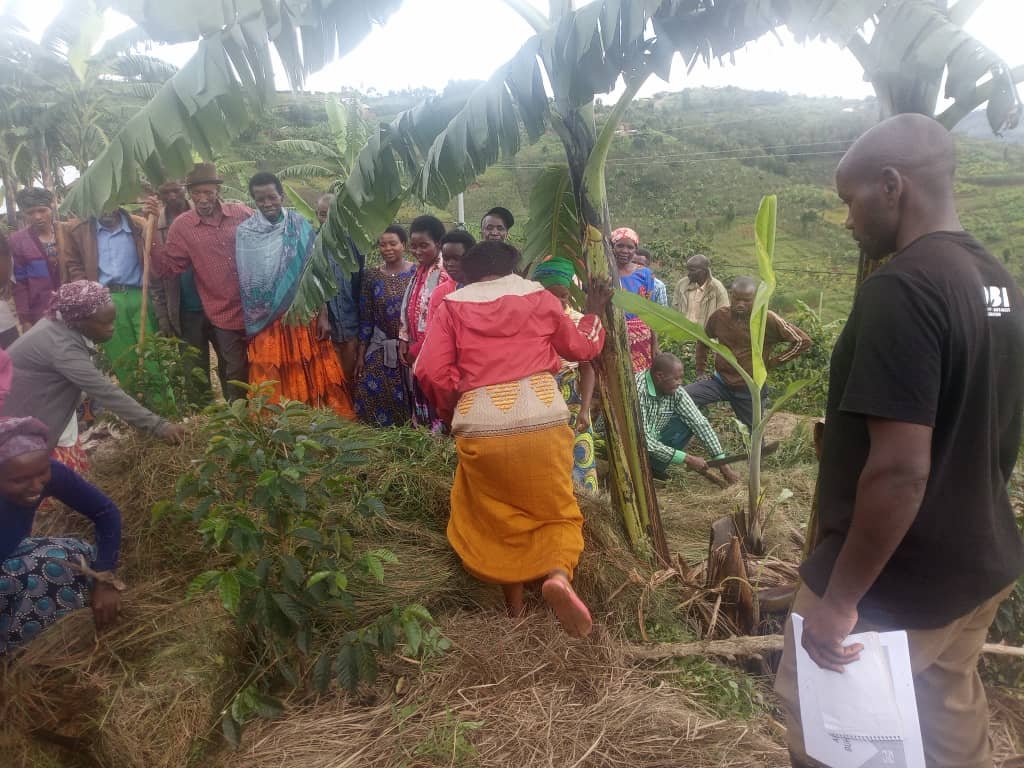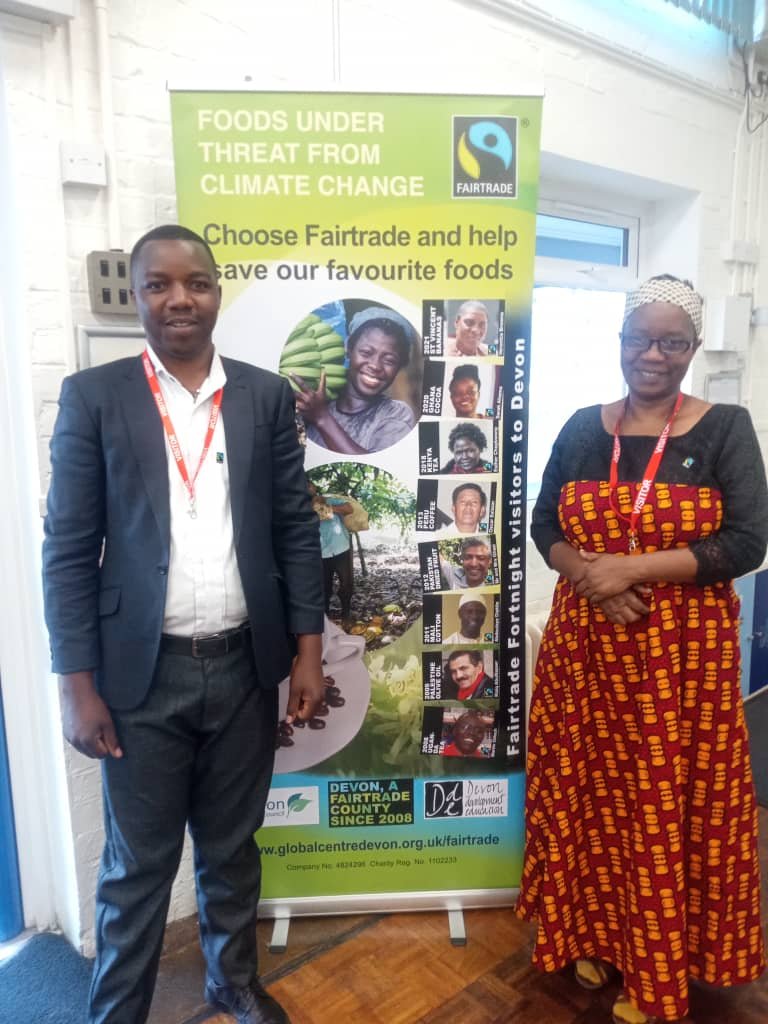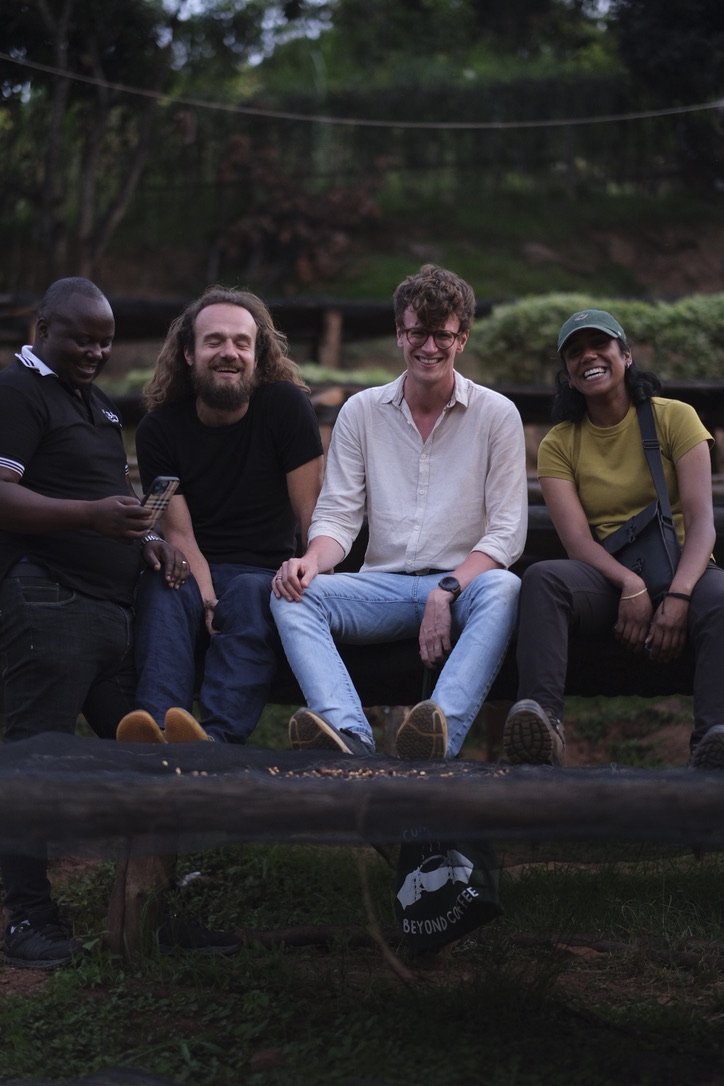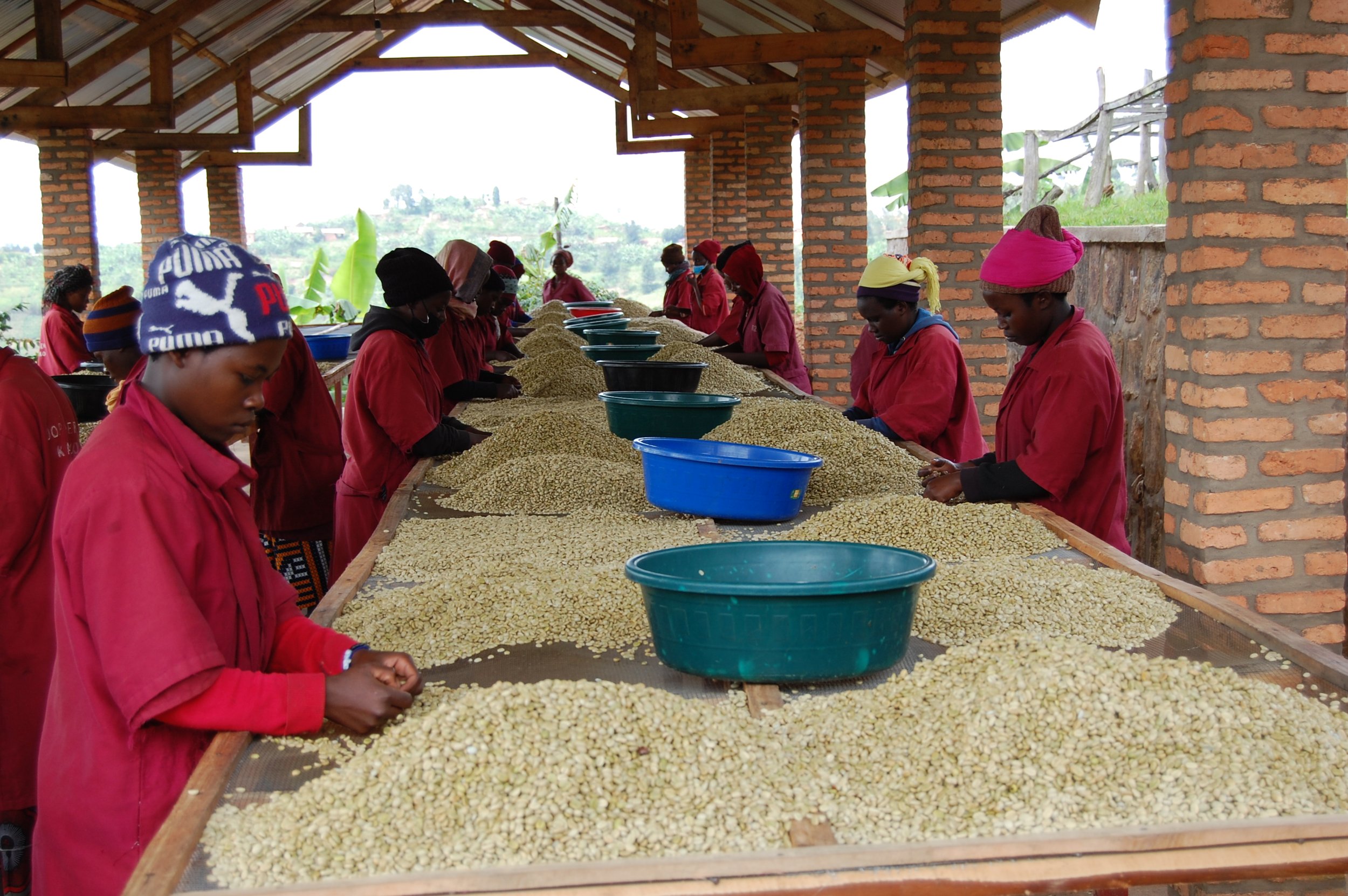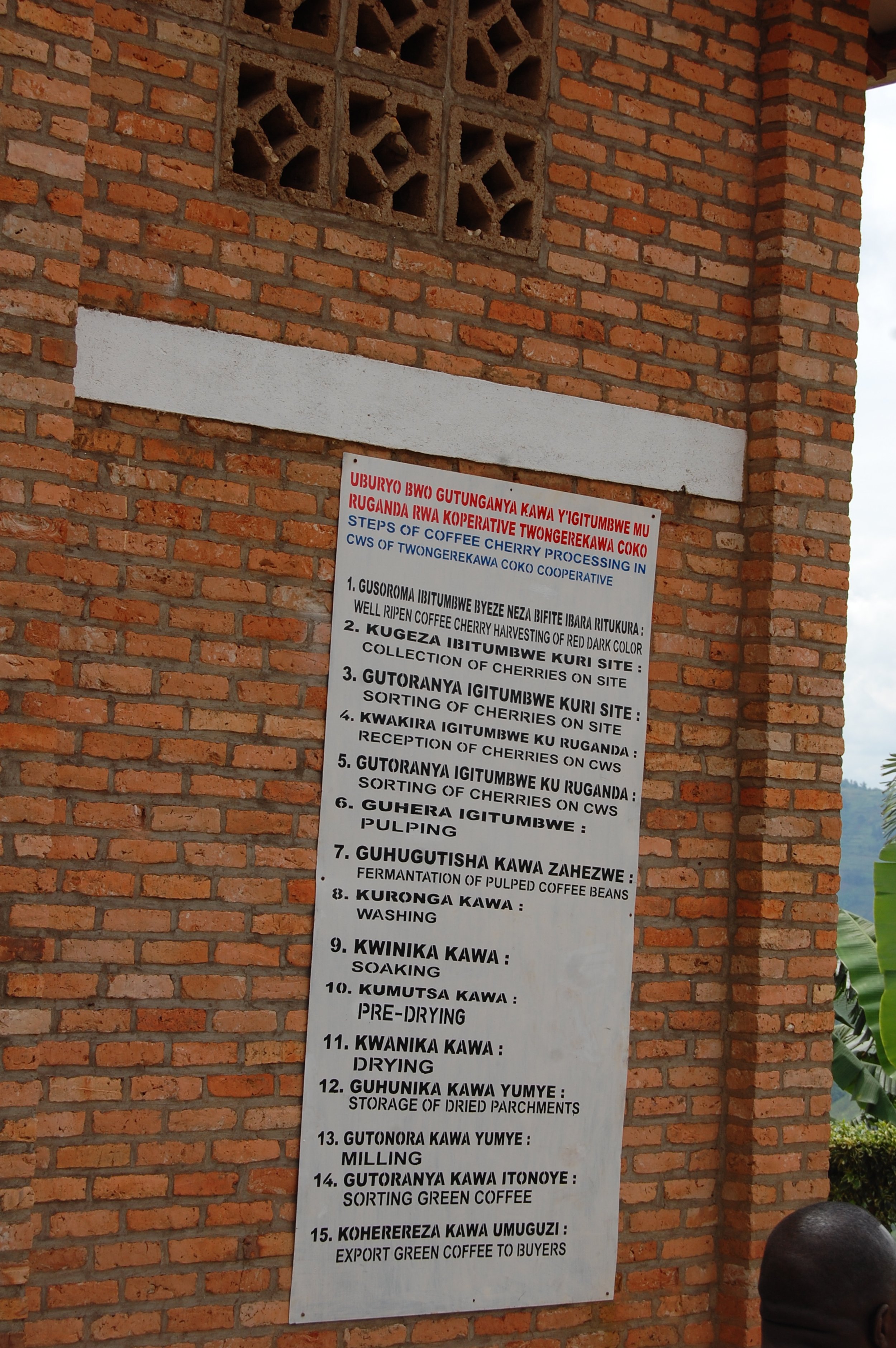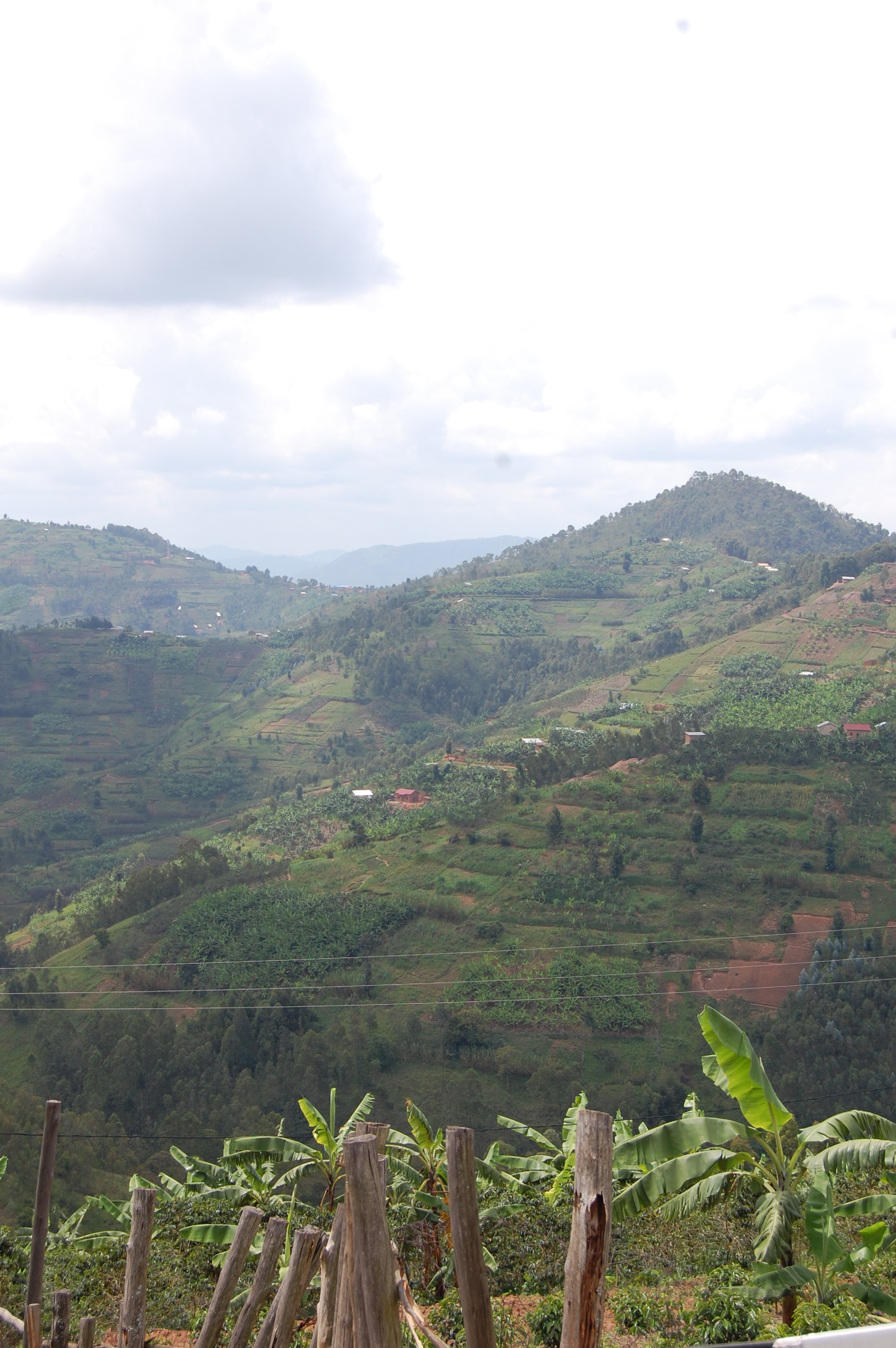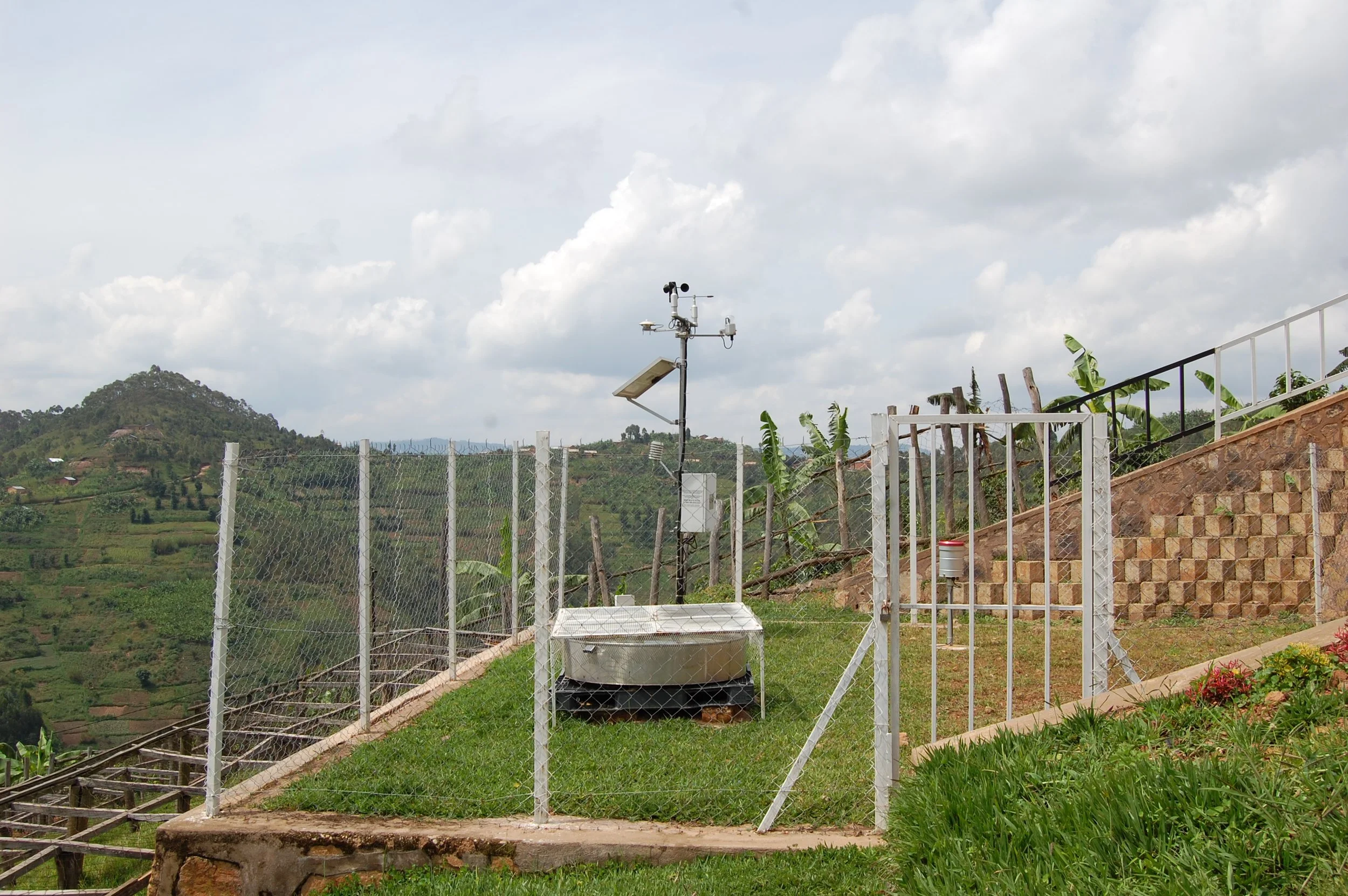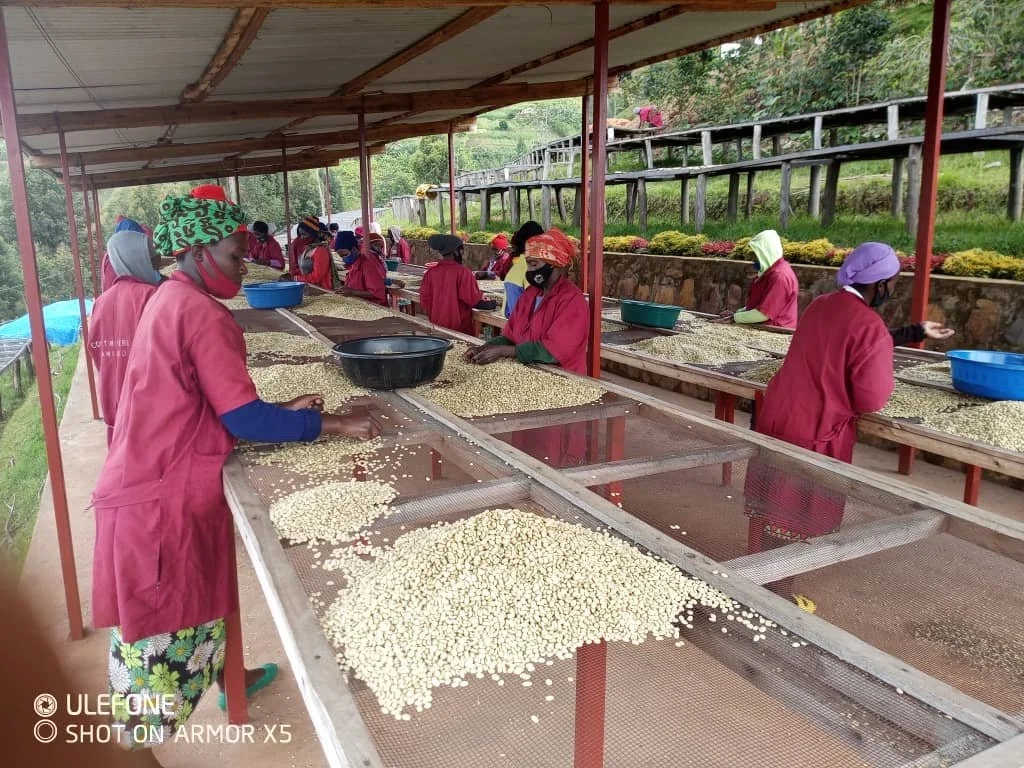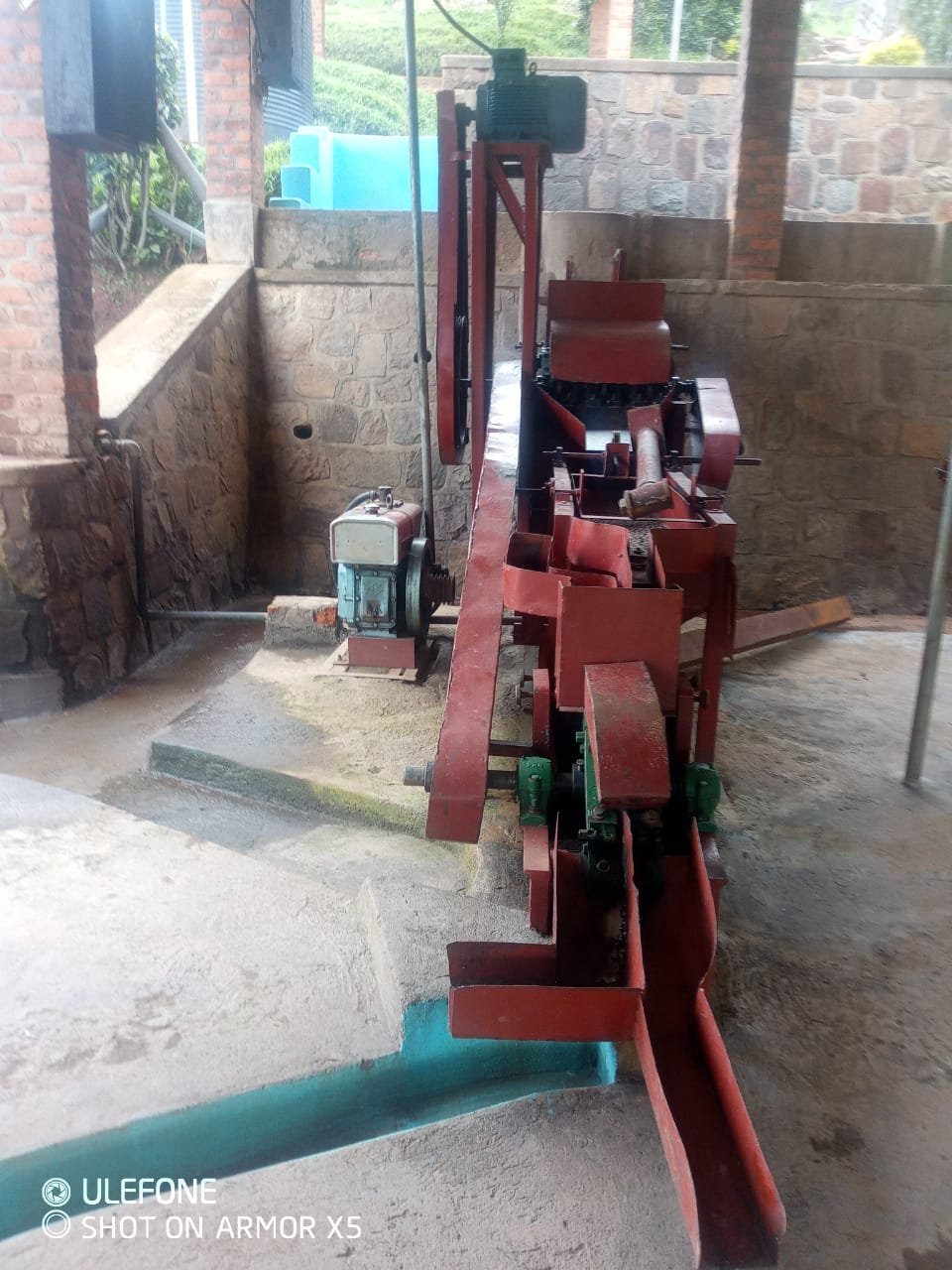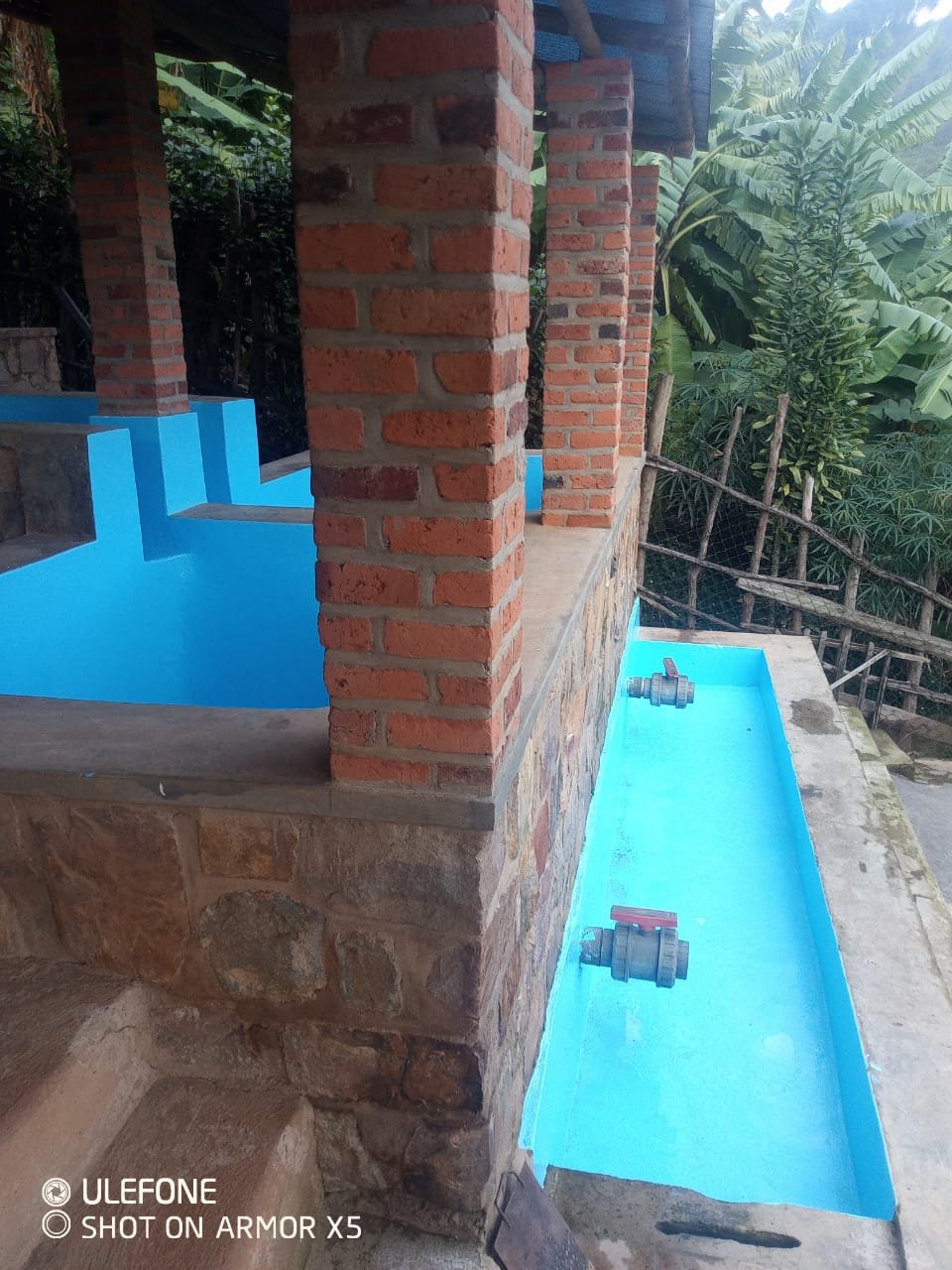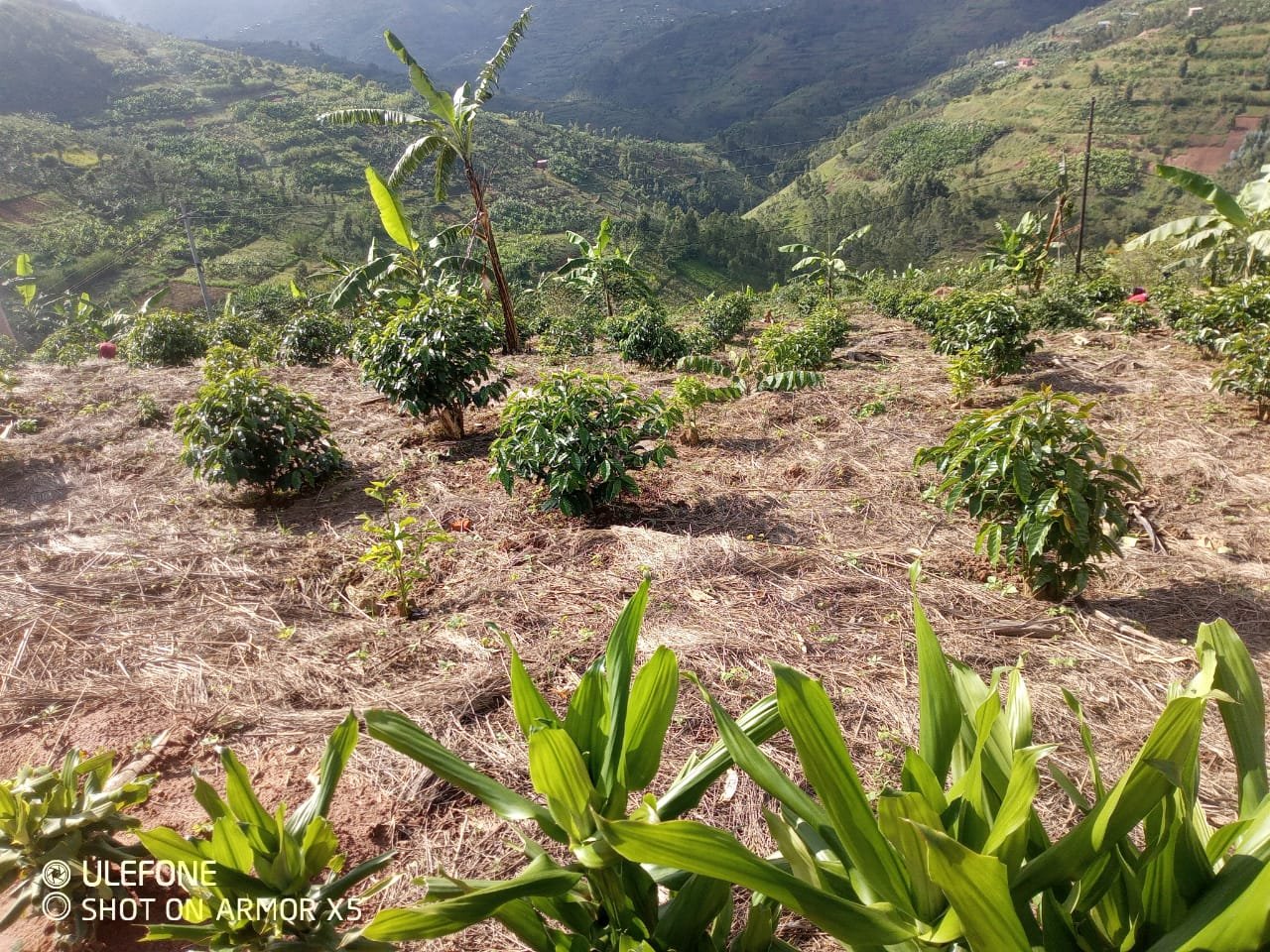Female force at its finest
Nestled in Gakenke District's highest reaches lies the Coko (pronounced CHO-co) washing station, run by Twongerekawa Coko, a cooperative society primarily led by women under the inspiring leadership of Therese Nyirangwabije - until 2023. The elevation imparts a unique character to their coffee— a crisp Rwandan black tea-like finish and the sweet notes of ripe citrus. But nature itself is only a part of the equation of course, it takes skill to bring these flavours to their maximum potential; in the long years which we have known Therese and the cooperative, quality has been remarkably stable throughout shifting weather patterns, and processing standards some of the highest in our entire portfolio.
However, Therese's leadership extended far beyond coffee production. She has been a driving force in helping women in the region diversify their skills and create crafts such as wicker baskets, honey and through a regenerative project which we support, the addition of fruit trees to the farmers’ plots, providing shade, nutrients, additional revenue and food for Coko’s members. Under her guidance, the women of Twongerekawa Coko have explored new avenues, unlocking their creative potential and realising a standard of living previously unthought of in rural Rwanda. We are curious to see what will become of Coko now that she has resignated her position…
-
Coko is the only washing station owned by the cooperative society Twongerekawa Coko. This coop's management is made up of twelve members: 8 women and 4 men. All of them are professional cultivators. The mission of Twongerekawa is to alleviate poverty among the 800+ smallholder farmers in the area, with a special focus on women. Their professional and agronomic background has inspired them to use a water-saving Colombian machine washer rather than more conventional fermentation methods. Even though Coko is located so high up in the mountains where running water is expensive - it is now able to rely fully on naturally collected mountain water for its fermentation and is in the process of obtaining full organic status. Their expertise has also allowed them to train smallholders to increase and improve their yields, and Coko is thus able to collect over 300 tonnes of high grade coffee from small plantations all around the washing station. Their results in the cup have been deemed impressive (and even scored 90+) by some of the world’s most prominent roasters such as Sweet Maria’s.
Twongerekawa also holds regular meetings in which women smallholder farmers are encouraged to share ideas with the coop’s members that could contribute to better livelihoods. It is encouraging to see so many initiatives in Rwanda being directed towards women empowerment - not just from a humanitarian point of view but, perhaps more pragmatically - because of equal treatment, training, and ownership increase overall income for all smallholders.
This washing station is built in an area with enormous specialty coffee potential, but when we first visited it was at full processing capacity. There is not much space to expand Coko’s drying bed capacity naturally, because of the steep slopes in the area. To expand, they must invest heavily in wood and sturdy construction, which This Side Up’s premium was reserved for after the 2014 harvest season.
Since 2014, Coko became a favourite among our clients. Back in 2014 and 2015 we were able to procure so much of their harvest that the premium of +1,87 p/kg financed the entire expansion of the coop’s drying capacity. These all-important drying beds are an example of how a small investment can lead to large growth. The beds eliminate a large bottleneck in Coko’s processing chain: they make it possible for them to wash and dry more coffee simultaneously, meaning more coffee can be sold as specialty coffee and less will be wasted and defected. We saw the new beds put to use in April 2015, the start of the harvest season. More Coko coffee for the world in 2015 - and higher income for all member smallholders!
Demand for Coko's coffee increased that season. In fact, three weeks after our shipment arrived in October, Coko was completely sold out. Also, because our online promotion, Kickapoo Coffee from the US got in touch with us and bought Coko again after three years. They too paid a large premium and bought even more coffee than we did, so Coko was able to sell a record amount of its coffee directly to foreign buyers. This is true development through openness and we're loving the results!
Later on, in 2016 and 2017, we worked together with Misozi and Coko to pioneer a simple but far-reaching innovation: to keep the coffees separated from our favorite collection points (that correspond with villages). We created a "village lot" from the cherries from Gitaba and Kavumu only, hoping to prome the coffee at the village level, so that the coop can further investigate the origins of desirable traits in the coffee, cross-evaluate lots, and allow both agronomists and farmers to spread their trait secrets across the coop's full membership base.
In fact, in 2016.2017, the coop's members decided to spend our premium on five cows. Milk represents the main source of protein for Rwanda's smallholders - and cow manure, along with organic compost, is the main ingredient for the coffee trees' fertilization. We hope these bovines will live long lives serving this and the next generation of Coko's farmers.
In between 2017 and 2018 Coko was able to attract direct buyers from all over Europe, who eagerly awaited their crop. The coop developed the village lot concept by not mixing the two village lots from last season (Gitaba and Kavumu) but separating three villages carefully: Buhuri, Gitaba and Gikamba. We cupped all three during the harvest and noticed enough regional variance to import them separately and gauge which characteristics appeal most to roasters.
The results were surprising: Buhuri exhibited a less citric type of acidity (more kiwi-like) which we found very exciting, whereas the Gikamba was the most floral. The Gitaba was the deepest, fullest sweetness, reminiscent of banana.
Later on, in 2018 and 2019, the coop experimented with a new processing method in close collaboration with its direct trade partners in Europe and Japan. They also coordinated with Abakundakawa and decided to not both make naturals and honey, but to jointly focus on one of these processing methods to create a differential offer. The result was more body, more dried fruits, and in essence a wholly new coffee. After the first pilot phase in 2018/2019, the process is now stable and can be called a new Coko product. The process focuses on removing around 60% of the coffee’s mucilage and then leaving it to dry on the shaded beds, turning it regularly. We are in love with this new process - so much so that half of our import is now Honey washed Coko! Next to this, the contact with Abakundakawa (Rushashi) inspired Coko to also start a nursery for fruit and shade trees, to slowly introduce agroforestry practices to its farmer members. We couldn’t more proud of this cross-pollination of farmers, visions, and practices are driven by intrinsic motivation.
THIS SIDE UP VALUE CHAIN
TRACEABILITY
You can find all the signed contracts and shipping documents that we made with Coko since 2021 below (Google Drive).
KEY ACHIEVEMENTS
2014: first direct sales of Coko coffee in Europe, built new drying tables to avoid production bottlenecks
2015: the cooperative bought and installed new pulper.
2016: first honey-washed trials, invested in five cows for manure and milk, first village lot created and exported
2017: instead of one coop "blend", we created three village lots: Gitaba, Buhuri and Gitambi.
2018: after years of perfecting the washed lots, Coko has taken the bold step to innovate in their processing: they have created their own style of honey process.
2019: inspired by the efforts of the agroforestry efforts of Rushashi, Coko started their own nursery for fruit and shade trees, to plant alongside the coffee.
2020: new and exciting developments took place in and around the cooperatives. A new meeting room, with staff offices was build. Next to this, an office for cherry was build. Around 1ha of land was bought.
2021: two stone walls around the coffee store were build. Another piece of land was bought adding up to 1,2 hectares.
2022: Coko gave 12 million (RWF) in restitution to farmers and 500 million (RWF) for loans to children’s schooling. Added to this. The cooperative started building two meeting rooms.
2023: Coko gave 23 million (RWF) for the construction of much needed meeting rooms for the women groups.
CULTIVARS
Arabica Bourbon types: French Mission, Jackson, Mbirizi, Pop 3303/21
Elevation
2,000 - 2,300 meters
NOTABLE
Since 2016, we are pioneering village lots by separating the coffees from our two favourite collection point lots on the cupping table: Gitaba and Kavumu. Organically produced (and certified), emphasis on women empowerment. : Coko supports its members by giving them a cow for manure and milk. They also offer chickens. The community works closely together and during the off-season, women weave baskets and clothes.
PROCESSINg
Fully washed and double fermented: all coffee is hand picked, depulped, dry fermented for 12 hours, then wet fermented (18 hours), washed with mountain water, shade dried, then sun dried on raised beds.
Honey washed: the coop takes selected cherries , pulps them without using water, brings them directly to the drying tables without fermentation or washing. Turning the coffee is labour intensive because the coffee still has the pulp on and can rot and ferment alcoholically very fast. Drying takes between 12 and 25 days, depending on the sun.
TASTIFY FLAVOUR NOTES
2023 CUPPING REPORT
We skipped the 2024 harvest and we intend to buy again from 2025. Access the landed samples report directly on the platform through link.
-
The price you pay for Coko honey p/kg. We agreed on this price directly with the farmers, disregarding the volatile US Coffee C price.
-
The price Twongerekawa pays farmers for their cherries as p/kg of green (milled) coffee. Coko pays 80% more than the national cherry prices set by the Rwandan Government. Farm gate in this case constitutes almost 50% of the FOT paid to Coko.
-
The cooperative costs incurred by COKO include buying cherries from the farmers, parchment processing, jute/grainpro bags, farmer training, management, certification & exporter fee.
-
Misozi will be the third party service used this year to facilitate the shipping from Dar Es Salaam, Tanzania to Rotterdam, Netherlands. COKO was responsible for organizing the shipment from Gakenke to Kigali. This was a FOT contract.
-
Average financing cost owed to (mostly social) lenders. This ensures immediate payment to the farmers when the coffee leaves the farm or port.
-
A standard TSU premium on all coffees designated exclusively to accelerate farmers’ own regenerative agriculture projects. Read more here at Regenerative Premium
-
This Side Up compensation for spending time and resources importing this coffee. Our work includes year-round contact with producers, managing export, shipping, import, warehousing, grading, sampling, finding and keeping roasting partners for COKO. € 1,22 is This Side Up’s Model 1 markup. For a full overview of our modular margin construction, see the Trade Models page.
Our QC’s flavour impressions
While Coko’s quality consistency has been lacking between 2021 and 2022, both the washed and honey recovered significantly this year. Fresh tropical fruits and thick raisins returned, with that typical black tea finish that we love so much about Rwanda. The honeys exhibit less tea and more raisins and are fabulous for espresso and milk-based drinks.
Coko Honey 2023-2024
Roasting advice
After some try outs we came to conclusion that our broad profile - Washed and Natural Africa run like a clockwork for the most of our (what a surprise!) African coffees. Its broad, but yet very efficient profiles that meant to highlight terroir and juiciness of our lots. Feel free to adjust length or temperature for more sweetness!
PHOTO GALLERY
You may use these images freely to promote Coko among your customers.
Contact COKO
Therese is the founder and director of Coko's wet mill. She is a progressive entrepreneur, with a long history with coffee. She only speaks Kinyarwanda but we use a translating app and whatsapp for direct communication - and so can you.
(FORMER) DIRECTOR: Therese Nyirangwabije
EMAIL: koperatwongerekawacoko@yahoo.com
TEL +250 (078) 759 18 62
Coko CWS, Gakenke District - Northern Province, Rwanda






